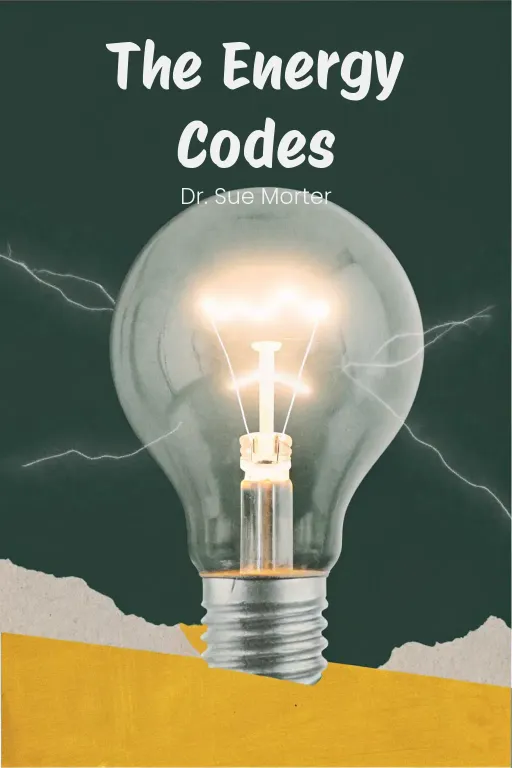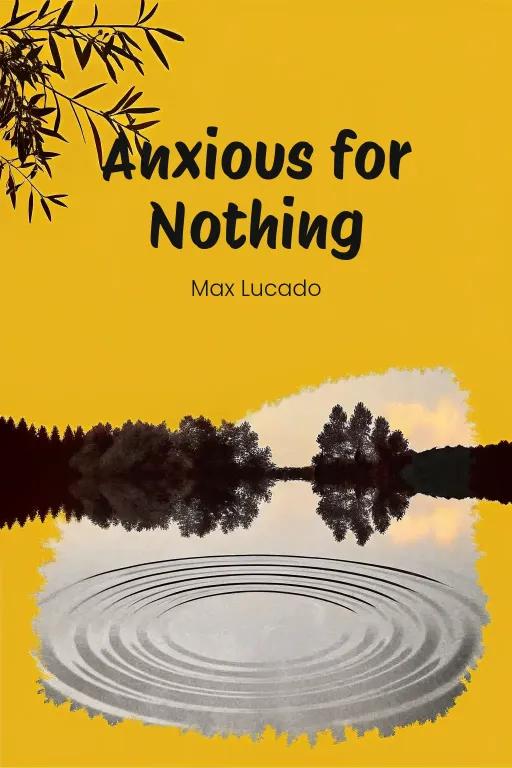
Find Calm: 3 Steps to Untroubled Trust
Podcast by The Mindful Minute with Autumn and Rachel
Finding Calm in a Chaotic World
Introduction
Part 1
Autumn: So, Rachel, tell me, when was the last time you woke up feeling completely at ease? No little nagging anxieties about bills, work, or just the state of the world? It’s kind of a constant hum these days. If inner peace exists, where does one even begin to find it? Rachel: Exactly! And that's why I'm all ears. Autumn: Well, that’s precisely what Max Lucado addresses in “Anxious for Nothing”. He dives into Philippians 4:4-8— a famous passage—and turns it into a real-world guide for finding peace amidst the chaos. It's not about suppressing your anxiety or just saying, "Pray harder." It's about cultivating a deep, unwavering trust in God. Rachel: Okay, but "real-world guide" is key here, right? Because if someone is truly anxious, just handing them a Bible and saying, "Figure it out!" isn't exactly helpful. I need concrete steps, not just abstract ideas. Autumn: Lucky for you, Lucado offers three actionable steps to transform anxiety into peace. First, actively celebrating God's goodness. Think of it as planting a stake in the ground amidst a storm. Rejoicing helps you stay grounded when things get overwhelming. Rachel: True, but that's way easier said than done. I mean, tell a stressed-out person to "celebrate," and see how that lands. It might not go over so well. Autumn: Which is why step two is vital: communicating our needs to God through prayer. Lucado describes this as a direct line to God's peace. It’s not about instantly fixing every problem but about finding calm through connection. Rachel: Okay, so we've got celebration, prayer... but what’s the third part? Because my brain doesn’t exactly default to peaceful thoughts, you know? Autumn: That’s the point of the final step: focusing our minds on what is good. It's like tending a garden. You pull out the weeds of negativity and replace them with thoughts that are true, noble, and lovely, just like Paul wrote in Philippians. Rachel: Hmm. So, we're building a fortress of faith, right? Stakes in the ground through celebration, a lifeline to God through prayer, and pruning back the mental chaos. Okay, I admit, that sounds like a pretty solid approach. So where do we actually start?
Celebrate God’s Goodness
Part 2
Autumn: So, step one: celebrating God's goodness... It's more than just being positive; it's a conscious choice to be grateful... It's about anchoring ourselves in truth, not fear... Max Lucado says anxiety loves that “what-if” cycle, always imagining the worst... But when we intentionally recognize God's goodness and sovereignty, it really resets our focus. Rachel: Okay, but how does that actually work? Sounds lovely, but when life throws a curveball – job loss, sickness, real hardship – how do you just flip a switch and find gratitude? Autumn: It's not about pretending everything is perfect or forcing a smile... Paul wrote Philippians 4:4 – "Rejoice in the Lord always" – while in prison! He wasn't cheerful because of his situation; he was rejoicing because of who God is... Paul could look beyond suffering and find peace in God's goodness... Lucado calls it trusting in God's sovereignty, which completely changes how we see problems. Rachel: Right, but Paul was Paul... Isn’t that setting the bar a little high for us average folks? I mean, writing encouraging letters from prison just feels… unattainable. Autumn: That’s why Lucado gives us practical tools to actually shift our perspective... He suggests keeping a daily gratitude list... It seems small, but it’s powerful... It helps train your brain to focus on blessings over fears... You could simply write, "Thank you for the warm coffee this morning," or "Thank you for the friend who checked in." Rachel: So, it's about retraining how we see things... But what about when you're in the thick of it? When everything feels overwhelming, will a gratitude list even make a difference? Autumn: Think of it like building a muscle... It takes time, but the more you practice, the stronger it gets... Lucado shares a story about Jerry and Ginger... Ginger has Parkinson’s disease, which could easily lead to anxiety and despair... But every morning, they start their day singing hymns together... They aren’t denying reality... It’s a deliberate decision to focus on God’s goodness, even with a chronic illness. Rachel: That's genuinely inspiring... When I wake up, my mind goes straight to the ever-growing to-do list... And these two are treating each day like it's a gift... Pretty humbling, actually. Autumn: Exactly! For Jerry and Ginger, celebrating God's goodness doesn't erase Parkinson's, but it does change their perspective... Instead of focusing on what's wrong, they focus on the blessings they do have: companionship, music, and faith... Lucado says gratitude becomes a shield against despair. Rachel: Got it – gratitude as armor... But let’s bring in a bit of science... Gratitude isn’t just spiritual; studies support it... It can lower stress, improve sleep, even boost happiness... So Lucado's suggestion isn't just good theology; it's good psychology. Autumn: Yes, that's key, it bridges the gap for anyone who thinks faith-based practices don't apply... On a spiritual level, gratitude does something even bigger... It shifts us from self-reliance to trusting in God's provision... It’s the first step in letting go of anxiety, because it reminds us that no matter what, God’s goodness remains constant. Rachel: And once you start seeing God's goodness more clearly, it’s not just celebration... It sets you up for the next step, right? You can confidently ask Him for help, knowing He cares... He's not indifferent or distant. Autumn: Exactly... Recognizing His goodness builds the foundation for prayer, where we bring our worries and fears to the One who’s already proven He’s trustworthy... But it all starts here: by celebrating His goodness, even in the smallest ways.
Ask God for Help Through Prayer
Part 3
Autumn: This fundamental perspective shift naturally leads us to seeking divine guidance through prayer. Rachel: Exactly, but here's something I've always wrestled with, Autumn. If God is all-knowing, why do we need to spell out our worries in prayer? Doesn’t He already know everything we’re going through? Autumn: That’s a really insightful question, Rachel, and one that Lucado actually addresses quite well. Prayer isn’t about informing God of something He doesn’t already know. Instead, it’s about inviting Him into the very center of our struggles. Rachel: Hmm, that's interesting. Autumn: Yeah, think of it like opening a door. Prayer allows Him access to those vulnerable places within us where we’re most afraid and need peace. It’s less about a transaction—you know, "Here are my problems, please fix them"—and more about building a relationship and trust by turning to Him. Rachel: Okay, I get that. So, prayer isn’t just a divine to-do list. But can we talk about that word “trust”? Because, honestly, in the heat of anxiety, trust feels like a pretty slippery concept. How do you go from the abstract idea of “Give your worries to God” to something that actually feels real and concrete? Autumn: Well, the key is intentionality in how we pray. Lucado emphasizes the importance of being specific. When you name your worries, you’re not just voicing them; you’re consciously handing them over. It brings clarity to what you’re asking of God and reinforces your belief that He’s involved in the details of your life. Rachel: That makes sense. Autumn: So, for example, instead of vaguely saying, “God, help me," try something more direct, like, “Lord, I’m really worried about my job interview tomorrow. Please help me to stay calm and articulate my thoughts clearly.” Rachel: Ah, okay. So you’re suggesting it’s more like having a focused conversation with a friend, rather than just sending out some kind of vague request to a “cosmic help desk”? Autumn: Absolutely. And this is where Lucado brings in the Parable of the Persistent Widow. Do you remember that story from Luke 18? Rachel: Is that the one with the judge who doesn't care, who finally gives in to this woman simply because she annoys him into giving her what she wants? Autumn: Exactly! In the parable, the widow keeps going to an unjust judge, demanding justice. He eventually gives in just to get her to stop bothering him. Now, here’s the point Lucado makes that I “really” like: God is nothing like that judge. He’s compassionate and attentive. If persistence works on someone who’s indifferent, how much more does it matter to a loving God? Persistence in prayer isn’t about pestering Him, it’s about expressing your faith that He’s listening and deeply cares about what’s troubling you. Rachel: I appreciate the picture that paints, but let's be real here - persistence is hard. What happens when the prayers don’t seem to be “working”? Honestly, if you’ve been asking and nothing changes, isn’t it easy to feel like you’re just shouting into the void? Autumn: I understand. That’s a valid struggle, Rachel, and Lucado doesn’t shy away from it. Persistence isn’t about wearing God down or getting exactly what you want. It’s about aligning your heart with His will and building faith through the process. And sometimes, prayer changes “us” more than it changes the actual circumstances. Rachel: Interesting. Autumn: For instance, the story of Vasili Arkhipov is a “really” powerful illustration of a “prayerful attitude,” even though it’s not directly about prayer itself. Rachel: Arkhipov, the submarine guy, right? During the Cuban Missile Crisis? I remember that story! Autumn: That’s him! He was the Soviet officer who essentially prevented a nuclear war by remaining calm under immense pressure. His ability to exude composure in such a chaotic situation had a ripple effect that changed the course of history. Lucado uses his story to illustrate how prayer can function in a similar way. Rachel: That's a great way to think about it. Autumn: When we remain anchored in God’s peace, that calmness spreads. It impacts how we approach our problems and how we interact with those around us. Rachel: So Vasili Arkhipov’s resolve would be like the equivalent of someone today saying, “Hey, no matter how intense this situation becomes, I can step into it with clarity because I know God’s got my back.” That does make prayer sound less like a passive practice and more like training for resilience, right? Autumn: Precisely. Prayer equips us to face life’s storms with steady hearts and minds. And it doesn’t stop with requests or persistence; Lucado also reminds us to always couple our prayers with thanksgiving. Gratitude transforms prayer into something truly powerful. By thanking God for what He’s already done, we shift our focus from fear and worry to trust and faith. Rachel: Kind of like saying, “God, I’ve seen you come through before, so I trust you’ll do it again.” That’s got to reframe everything for individuals who feel as though they’re stuck in survival mode. Autumn: Right? And Lucado shares the story of Jerry and Ginger to highlight what this looks like in real life. Remember them—the hymn-singing couple facing Parkinson’s disease? Rachel: Yeah, and honestly, I still can’t get over the fact that they’re able to wake up every morning and sing. That’s a small thing, but it's also huge, especially knowing the battles they’re up against. Autumn: Exactly. So their practice of singing hymns is an act of thanksgiving—a deliberate way to bring joy into their day. It doesn’t deny the fact that Ginger is battling illness, but it refuses to let fear dictate their perspective. It’s a living example of how gratitude infuses our prayers with resilience and transforms the way we approach difficulties. Rachel: Alright, so let me make sure I’ve got this straight. When you’re praying, don’t just ask for help—be specific about what’s on your heart. Keep at it, even when it feels unanswered, because persistence strengthens faith. Tie it all together with gratitude, so you’re approaching God with trust and thanksgiving, right, not just out of desperation. Have I missed anything? Autumn: That's a great summary. And here’s the key connection: when you pray specifically and persistently with gratitude, you begin to experience the peace that Paul describes in Philippians 4:7—the peace that “surpasses all understanding.” It's not just about feeling better; it’s about rewiring our hearts and minds to fully trust God. Prayer isn’t passive; it’s transformative.
Meditate on Good Things
Part 4
Autumn: Right, so after we hand our worries over to God, the next step is learning to leave them there . And that's where the real magic happens, you know? We've prayed about it, now it's time to actively think about good things . It's not just about feeling better in the moment; it's about transforming our minds for the long run. Rachel: Okay, so it's like “rewiring” the brain, right? I get the idea of surrendering, but let's be honest, my brain doesn't just shut off the worry the second I pray . So, you're saying it takes effort, like mental training? Autumn: Totally, it's not a one-time fix . Max Lucado uses this great image of an air traffic control tower to describe our thoughts . We have to decide which thoughts get the green light . Philippians 4:8 gives us the criteria: whatever is true, noble, just, pure, lovely, and admirable—those are the thoughts we want landing on our mental runway. Rachel: So, it's not about avoiding bad thoughts, but about actively choosing better ones instead . But when you're in a “really” tough spot, isn't "filtering your thoughts" just pretending everything's okay? Autumn: Not at all . It's not about ignoring the challenges, it’s about changing your inner voice, making it match God's truth . Lucado calls anxiety a "meteor shower of what-ifs," which is so true . We get bombarded by fears when we're vulnerable . But renewing your mind is about redirecting that energy . So, instead of dwelling on the worst-case scenarios, you focus on a promise like, "God will supply all your needs" from Philippians 4:19. Rachel: Okay, I get the idea of rewriting your internal script . But sometimes, that worry pen feels super glued to my hand . Any tips on how to pry loose the negativity? And don't just say "stop thinking negative thoughts," because that's about as helpful as telling someone in quicksand to relax. Autumn: <Laughs> Fair enough . It’s not about willpower alone . This is where spiritual tools come in handy . Lucado talks about "abiding in Christ," from John 15—it's powerful! Like a branch needs the vine to live, we need to stay connected to Jesus for emotional and spiritual nourishment . It's not about trying harder; it's about drawing strength from Him, you know? Rachel: The vine and branches thing, yeah, I get it . It's a good visual . But I need specifics, Autumn; what does "abiding" actually look like when you're anxious? Autumn: For sure . Lucado has some great strategies . First, engage with scripture daily . Verses like Philippians 4:8 or John 15:4 are like a mental compass, pointing you back to truth . He also suggests keeping a thought journal—writing down your worries and then writing a scripture verse that counters each one . It's about spotting those negative patterns and intentionally breaking them with God's promises. Rachel: A thought journal, huh? So, if I write, "I can't handle this," I counter it with, like, Philippians 4:13—"I can do all things through Christ who strengthens me" . It's like turning an anxiety audit into a meditation, right? Autumn: Exactly! And there’s more . Gratitude journaling, surrounding yourself with positive people, visualizing your connection with Christ—these are all small, intentional actions that shift your focus . Like, when you're in a crisis, picturing yourself as a branch connected to a life-giving vine can be incredibly grounding. Rachel: I can see how that could work, creating a mental safe space . But let's talk real life . Does Lucado give any examples of when this meditation thing actually made a big difference? Autumn: Absolutely . One of the most touching stories he shares is from his own life . When his father-in-law was dying, he was overwhelmed—oxygen tanks, medical bills, caregiving stress . He was far from home, just spiraling . But then he grounded himself in John 15:4 and deliberately focused on God’s provision . He started remembering specific times God had provided—everything they needed had come at just the right moment . It transformed his emotions right then and there. Rachel: So, instead of getting caught in the panic, he redirected his attention to proof that God had been there before . It’s like reminding yourself, "He’s helped me before; He'll do it again." Autumn: Exactly . That's the key, because once that perspective shifts, you create space for peace in the middle of chaos . And there's another example he shares, about a woman named Christyn Taylor, who cared for her daughter Rebecca, who had a ton of medical procedures . Christyn could have easily been consumed by fears about her daughter's future . Instead, she chose to focus on God’s past faithfulness and the small joys in their family life . That constant practice of gratitude helped her fight the weight of anxiety. Rachel: So, for Christyn, it wasn’t ignoring her daughter’s problems, it was strengthening her emotional core with gratitude . That takes serious strength . And, honestly, it makes me think about how I let smaller stuff throw me off course. Autumn: I know, right? It’s incredibly humbling . But it’s also inspiring, because it reminds us that this kind of strength isn’t just for super-humans . Anyone can do this, if they’re willing to commit to renewing their spirit . And Lucado says it perfectly—meditating on good things doesn’t just suppress negativity; it transforms how we think over time . It teaches us to steer our hearts toward hope and joy. Rachel: So, real peace isn’t some magic button; it’s a discipline . You have to focus on God’s truth, practice gratitude, and rethink those "what-if" thoughts . Alright, I’m convinced . There's definitely something to this.
Conclusion
Part 5
Autumn: Okay, so to sum it all up, we've talked about how Max Lucado's book, “Anxious for Nothing”, really points us towards finding peace, even when anxiety is hitting hard. It begins with appreciating God's goodness, acknowledging His power, which kinda recalibrates how we see things. Then prayer helps us let go of our fears and invite Him into what we're going through. And finally, thinking about good things, you know, focusing on truth, being thankful, and staying hopeful, helps us refresh our minds. Rachel: Right, and let's make it clear, this isn't some band-aid solution or just telling yourself to be positive. This is really about creating a way of thinking and living that's based on what God promises us. If you're dealing with anxiety, these steps aren't just nice-to-haves; they're really vital tools for getting through it and growing stronger. Autumn: Exactly. The main thing is pretty straightforward, but it's powerful: peace isn't about managing everything around you, it's about trusting the One who’s already in charge of what's to come. So, today, whether you start noting things you're grateful about, or really focus in your prayers, take a small step to move your attention from worrying to trusting. Rachel: Yeah, and keep in mind, it's a journey, not about being perfect. Keep planting those seeds of faith and let God do His thing. Because as Lucado puts it, we can chill out, be anxious for nothing, because we're relying on Him for... well, everything.









